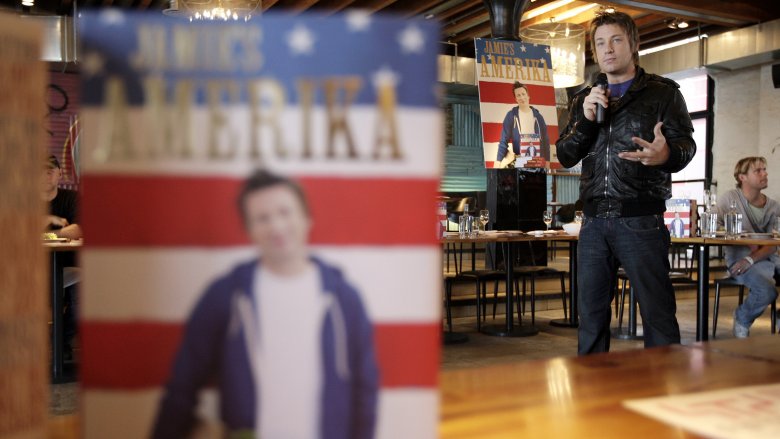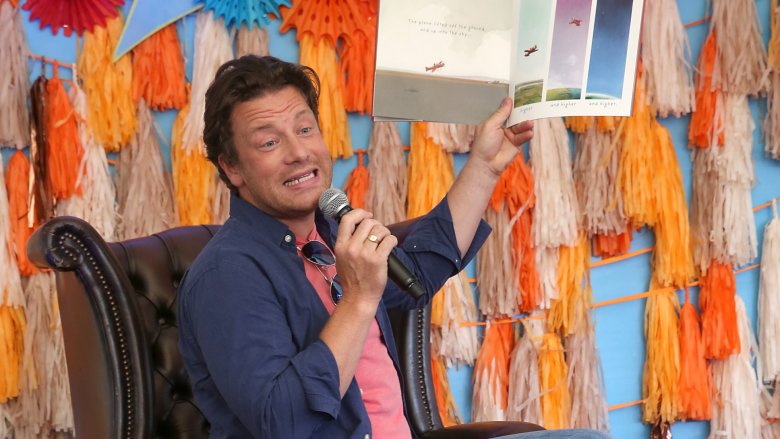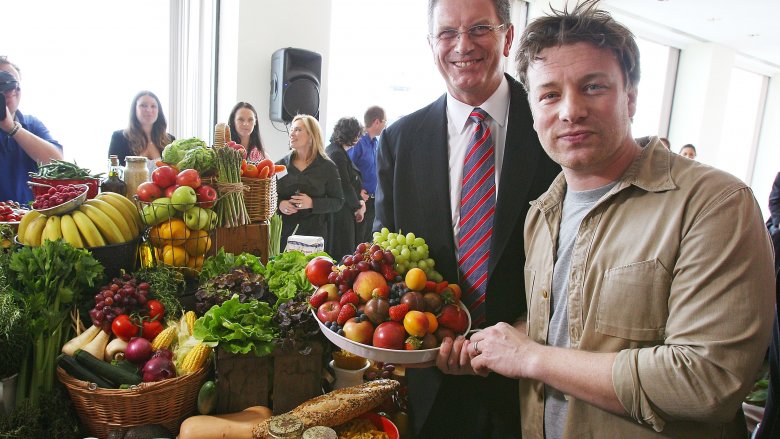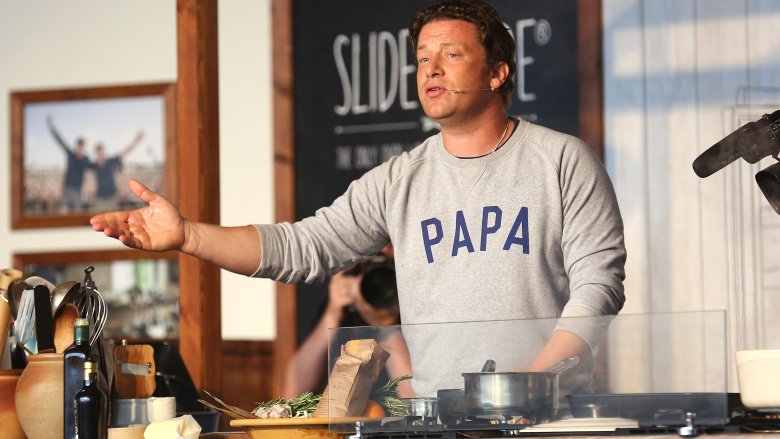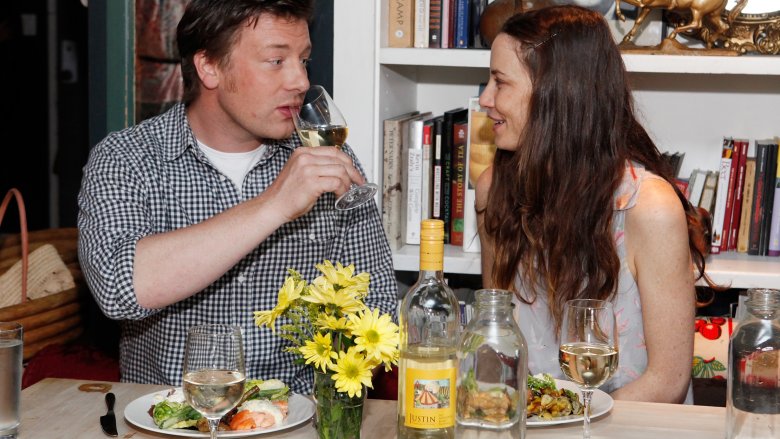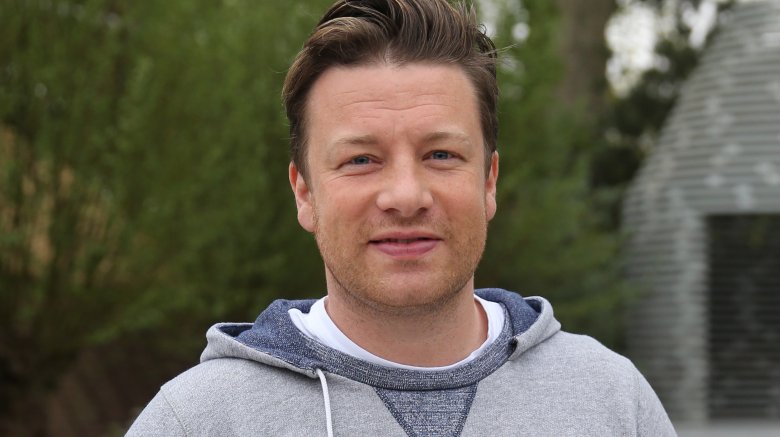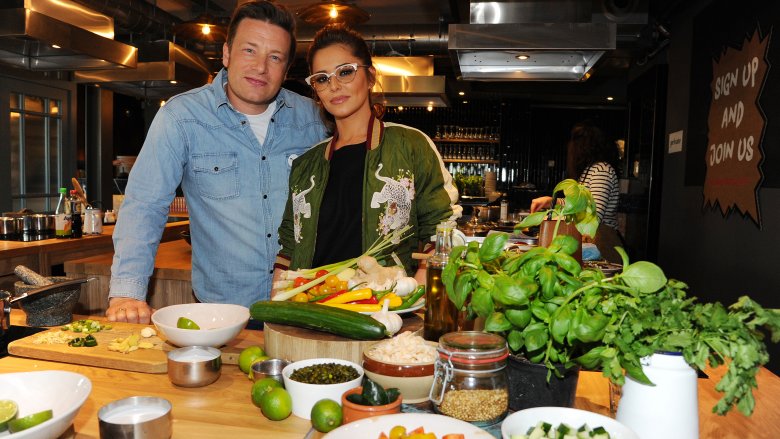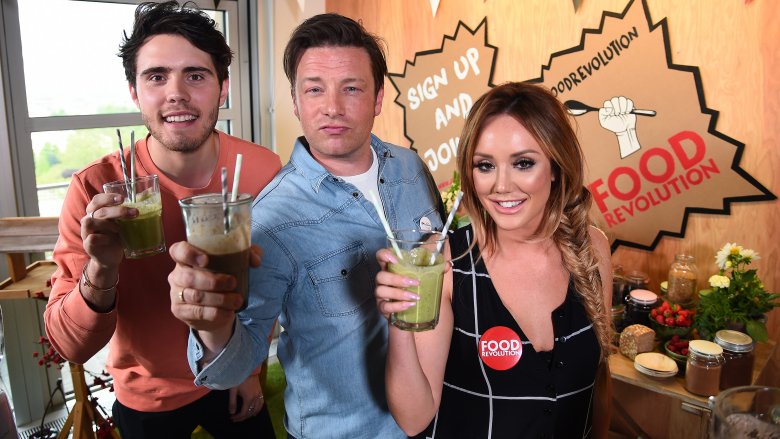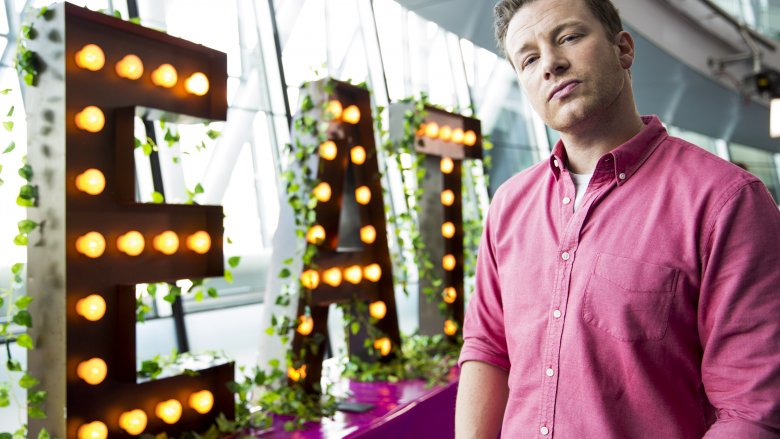The Untold Truth Of Jamie Oliver
Jamie Oliver is the British chef who hit it big with The Naked Chef, a show he told People made him worry, "... my mum would think I was a porn star." Since the show took off, he's become not only massively popular, but incredibly polarizing. He's a love-him or hate-him figure, and he's managed to stir up as much controversy as inspiration. Let's look at what goes on behind all the hype — and all the hate.
He finished reading his first book at 38
When The Guardian released their figures for the most popular book titles of 2017, Jamie Oliver claimed the top spot (blowing away writers like Dan Brown) with his cookbook 5 Ingredients — Quick & Easy Food. It's not entirely surprising, as his cookbooks have sold hundreds of thousands of copies and helped make him a multi-millionaire. What is surprising is that for as prolific a cookbook-writer as he is, he never finished reading a book until 2013.
He told The Telegraph that until he picked up Suzanne Collins' runaway hit Catching Fire, his dyslexia had kept him from ever finishing a book. He went on to say he tends to get "bored easily" while reading, and even got into a bit of an argument over it. He almost finished one of Anthony Bourdain's books, but the travel-and-food writer gave him such grief, Oliver burned the book. Collins' young adult dystopian novel held his attention, though, but he declined to say why he started with the second book in the series.
He's dyslexic, and believes it should be championed
Oliver is outspoken about a lot of things, and that includes his dyslexia, difficulty reading, and being called "a thick kid" in school. When he talked to the Radio Times in 2017, he had just released his 20th cookbook and was sitting top of a £150 million fortune — and he credits his dyslexia for giving him the perspective he needed to build that.
"If I'm in a meeting I just see problems differently and I obsess about things differently," he told them. "Because I'm dyslexic, sometimes, when it requires a load of stuff to be done, I just do it. It's like I'm a massive ten-tonne boulder rolling down the hill."
He also says he believes it's incredibly important to treat people diagnosed with dyslexia in such a way they recognize it not as a disability, but as a gift they were "lucky, lucky" to receive.
He was once asked to prepare human meat
You expect any chef to get some odd requests every so often, and celebrity chefs get them on a massive scale. According to Oliver (via The Times), he once had to turn down a television producer who pitched the idea of a show where he cooked human flesh.
That's right, human flesh. Oliver says it was just a bit too much for him, and then added there was no real challenge there... because he already knew what it tasted like. "Pork. It tastes exactly like pork." That's the end of the story, although you get the feeling it isn't really, right? Inquiring minds want to know what went on there.
His wife was behind the crazy kids' names
So, the elephant in the room. Oliver and his wife, Jools, have given their kids incredibly weird names. There are five: Poppy Honey Rosie, Daisy Boo Pamela, Petal Blossom Rainbow, Buddy Bear Maurice, and River Rocket Blue Dallas. When someone pointed out that one of the girls appears to be named after a My Little Pony character (Petal Blossom), The Telegraph reported Oliver's wife was a bit outraged, and volunteered the opinion that she "hated" other people's opinions about baby names.
She added, "Whatever you call your baby is your decision," saying that "Rainbow" had been her first choice but her husband had told her "to calm down."
He's cautious about veganism
Take a peek at what Jamie Oliver (and his website's food team) has to say about going vegan and you'll get a confusingly mixed message. Oliver's writer Jonny Garrett sang the praises of a vegan lifestyle for 2014's World Vegan Month (which is November, in case you're curious), testifying to how much healthier it was for people and for the planet, while talking a bit about how observing the restrictions of veganism could make you better at improvising in the kitchen and coming up with new ideas.
But a month later, the food team posted the blog entry, "Is a vegan diet healthy?" They came to the conclusion while eating mostly veggies might make you skinnier, they also cautioned that cutting out animal products meant you weren't going to be getting a lot of key nutrients like zinc, iron, vitamins D and B12, calcium, and omega-3 fatty acids. Not from the normal sources, at least, and noted that going strictly vegan came with a huge caveat. For someone as outspoken and opinionated as Oliver, his views on veganism are pretty vague.
He has some weird hangover cures
Oliver has a ton of ideas when it comes to the kind of drinks every party needs, so it's not surprising he has some advice on how to deal with the after-effects of all those beverages. He talked to Red about some of his favorite hangover cures, and they're more than a little weird. At the bottom of his list he puts a massive plateful of Huevos rancheros, and alongside that is a basmati rice-based dish called kedgeree. It includes haddock and a few eggs, too, and if that doesn't seem like your thing he also recommends sitting down to a full English breakfast.
Need some faster relief? He says go for a pint of Guinness or a spoonful of cumin, and swears that will sort any hangover out straight away.
He got in some serious trouble over child discipline
In 2014, there was some serious social media backlash after he shared his recipe for punishing his children.
"I give them chillies for punishment," he told the BBC Good Food Show (via The Daily Mail). He went on to say since beating kids is "not very fashionable and you are not allowed to do it and if you are a celebrity chef like me it does not look good in the paper," he needed to find other ways. Apparently, that's Scotch bonnets. PepperScale says this pepper clocks in at anywhere between 100,000 to 350,000 on the Scoville scale (which we talk about in-depth in this article), as much as 140 times hotter than a jalapeno. Oliver described the punishment dished out to then 12-year-old Poppy, who had gotten "quite disrespectful." When she asked for an apple a bit later, he cut it up, rubbed it with a Scotch bonnet, then gave it to her.
The Telegraph writer Andrew M Brown took particular issue not only with the tools, but with Oliver's admission that he waited until well after the incident happened to teach her a lesson. Pretty dark? The media thought so.
He got some serious hate for televised slaughter
It's no secret where meat comes from, but Oliver pushed the boundaries in a big way back in 2005. First, a bit of background. Regulating bodies in the UK dictate what can and can't be shown before 9 p.m., a magical time called the watershed. Ofcom says it's to protect children, so there's no swearing, nudity, excessive violence, or other similar content. Oliver 100 percent broke pretty much every rule when he slaughtered a fully conscious lamb on television, well before the watershed.
The show was Jamie's Great Escape, and he was in Italy for the episode where the fully conscious lamb was held down as Oliver slit its throat after admitting he didn't know what to do and a farmer stepped up to show him where to cut. Animal rights groups were outraged, because the killing of a fully conscious and aware animal was grossly inhumane. Oliver's camp disagreed and called the piece "honest," while Advocates for Animals said the "brutal slaughter shows no compassion or respect for the poor animal."
He's condemned the First World's poorest people
In 2013, Oliver found a new target: Britain's working class. To say his comments weren't well-received is a bit of an understatement, and to many, it showed just how out-of-touch he was. The Telegraph reported he condemned a family eating cheese-covered chips while sitting in front of a big TV, while claiming the foods he saw as the working-class go-to — things like premade, microwavable dinners — were more expensive than the fresh foods he saw other people in other nations eating. He lamented the fact Britain's working class weren't taking the opportunity to eat the same raw mussels, fresh tomatoes, and fresh, homemade pasta on the table in Sicily, a meal he says costs only 60p (or less than a dollar).
Advocates hit back hard (via The Telegraph), saying he didn't understand the difficulties poor families faced. Trussel Trust was one group trying to show Oliver the other side of the coin, with representative Molly Hodson pointing out, "We meet people who are literally making a choice between buying food and paying the rent, or parents who are skipping meals to feed their children full stop."
Some of his recipes have united nations against him
It's part of Oliver's job to be proud of the recipes he creates, but not all have been home runs. In 2014, he shared his recipe for jollof rice, a traditional West African rice dish. No one in West Africa was impressed, and the BBC reported droves of people took to social media to condemn the recipe that was anything but traditional. Complaints included Oliver's use of ingredients that have never been associated with jollof before — like lemon, coriander, and parsley — and also his turning the dish's usual tomato base into whole vegetables. Oliver defended the dish, saying it was labeled as his "twist" on jollof, not the real thing.
He was back at it in 2016, when he managed to offend all of Spain with his "twist" on paella. His biggest offense was including chorizo, which is in no way traditional and made the dish less paella and more what The Guardian said people described as "rice and stuff." Other commenters were less generous, calling Oliver a "terrorist," and suggesting he "make some chicken nuggets out of your own fingers."
His school lunch program isn't the success he claims
Oliver has traveled all over Britain and America in an attempt to completely overhaul school lunch programs, and he's not always welcome. Treehugger reported on the outright hostility he got in West Virginia and his filming ban in Los Angeles, but to his credit, he didn't give up. He did, however, admit to the Radio Times (via The Telegraph) in 2015 that it hadn't gone as planned. Oliver claimed eating right was still viewed as a privilege of the upper and middle classes, but follow-up studies of the meals he did put in place suggest there's something else at work here.
In 2016, The Independent reported on data taken from schools that had put a Jamie Oliver school lunch plan in place amid his warnings that things needed to change or obesity would continue to rise. With the plan in place, obesity rates of Newham schools rose from 24.7 to 27.4 percent, while Islington obesity numbers rose from 21.8 to 22.8 percent. Oliver's other big claim — that grades would rise — didn't pan out, either.
His pink slime comments caused layoffs and a lawsuit
In 2011, Oliver took aim at the meat packing industry in general and the so-called "pink slime" in particular, kicking off a lawsuit that was still going in 2017. It started with an April episode of Food Revolution (via The Telegraph) where Oliver put the spotlight on the process of separating meat and washing it in ammonium hydroxide, a process still completely legal and used in the preparation of school lunches in Iowa, South Dakota, and Nebraska. The fallout was so severe Beef Products Incorporated was forced to lay off 750 employees, who turned around and sued Oliver and ABC News for the "dissemination of untrue facts and misinformation".
Oliver wasn't the only one condemning pink slime — The Washington Post says it had been questioned a few years before by The New York Times — but his opinion was the one with the highest profile. The case was still going on in June of 2017, and Reuters reported it was taking place not far from BPI and being watched as a conflict between big media and big agriculture.
He says he's proved a sugar tax works
Even people with only a passing knowledge of what Oliver is all about know he's embarked on a crusade against the evil that is sugar. The nutrition team of his Food Revolution broke down not only the different types of sugars but how much we should average and how we can reduce what we're eating. That's all well and good, but Oliver has also preached going a step further and taxing foods containing sugar.
In October 2017, The Guardian reported Oliver used his own Italian restaurants for a trial to see whether or not adding a tax on sugar-heavy drinks would reduce the number that were purchased. A follow-up study from the London School of Hygiene and Tropical Medicine found that sales were down about 9.3 percent after six months, but experts were cautious about assigning the drop explicitly to the tax. For Oliver's part, he also announced he wasn't going to be keeping the money and would instead donate it to buying water fountains for schools and providing students with food education.
He's been called out as a sugar hypocrite
Oliver has shouted pretty loudly about his condemnation of sugary drinks, and in 2016 he celebrated when his sugar tax made it into the government's budget. But the public was quick to point out he was being more than a little hypocritical, and The Telegraph looked at how.
The new sugar tax was going to be a tiered tax based on how much sugar a food contained, but a huge percentage of the recipes on Oliver's own site contain astronomical amounts of sugar. Those include a recipe for gammon cooked in four litres of cola, drinks that contain a few tablespoons of sugar per serving, and a "Children's party cake" that has three times a child's daily recommended sugar intake in each slice. Social media took up the call, finding cakes, cordials, tarts, and even savory dishes containing more sugar than the fizzy drinks he was campaigning so vocally against. Twitter was unimpressed.
He collects driftwood
Every chef has their hobbies outside the kitchen, and Oliver admitted to The Telegraph that one of his is collecting driftwood. That's not the end of the story, though, and he says there's a method to his madness. Since driftwood comes in all shapes, sizes, and kinds, he says it's perfect for making his own chopping boards. He says they're the same quality you'd find in a high-end boutique, which makes you wonder if that's going to be next on his list of products to bring to the market.
